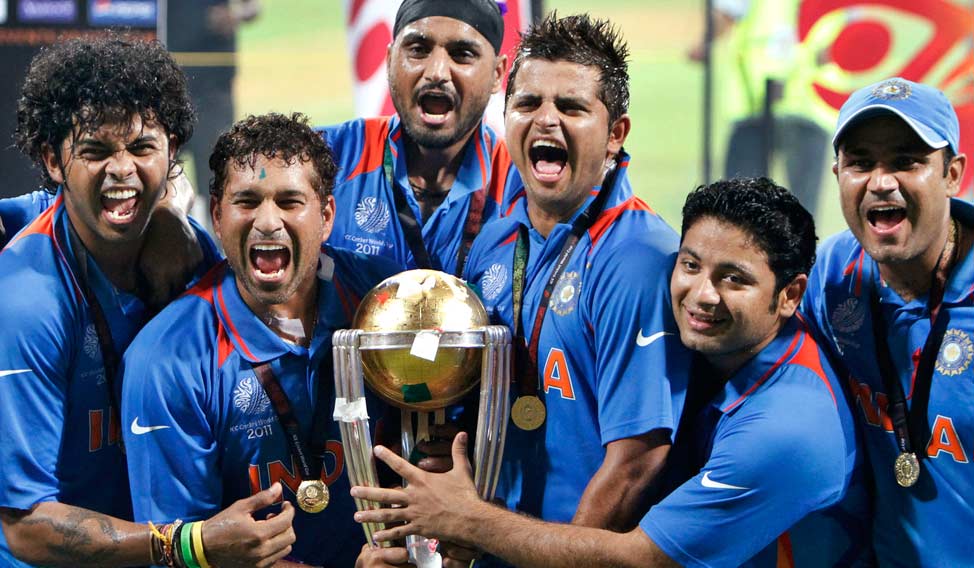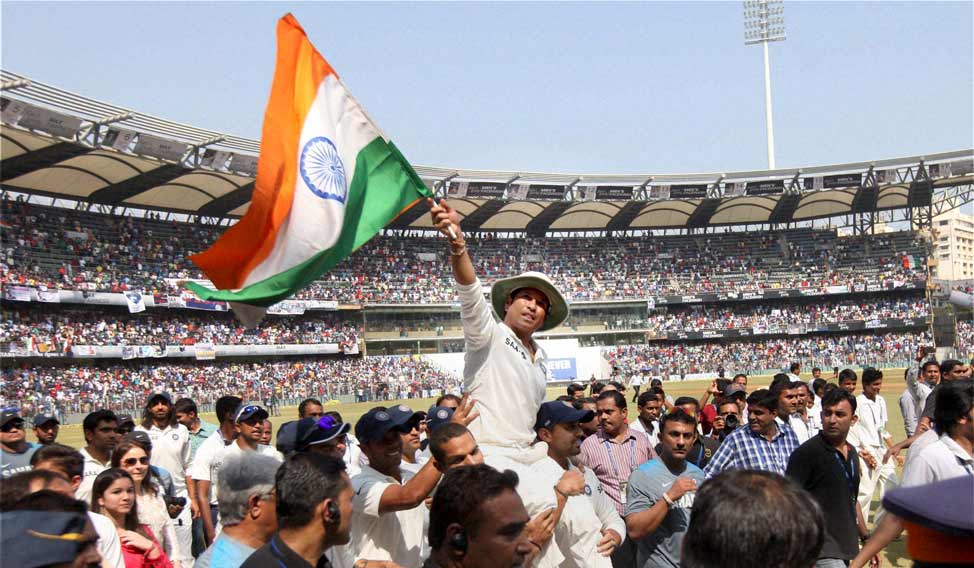If cricket is a religion in India, Sachin is God. It might sound cliched (it is, incidentally, the title of a book on him), but it's true. If 24 years of pure cricketing excellence on the field wasn't proof enough, Emmy-nominated director James Erskine has established it beyond doubt with Sachin—A billion dreams.
Almost four years after he bade a tearful goodbye to the 22-yard strip at the Wankhede Stadium in his hometown Mumbai, the chants of “Sachin... Sachin...” are back. Not on the cricket field, but in theatres across the country. In fact, Erskine's 138-minute docu-drama (it is not a film, per se) is a nostalgic walk down memory lane for cricket lovers in general, and Sachin fans in particular.
You laugh at the pranks of the little, curly-haired mischief-maker in Shardashram Vidyamandir school and the Sahitya Sahawas colony, where he lived. You sit up in your seat in anticipation when his sister Savita gifts him his first cricket bat, which she bought from Kashmir. You rejoice with the 10-year-old Sachin, when Kapil Dev lifts the World Cup in 1983. You nod in agreement when Sachin narrates how his older brother Ajit saw a “spark” in him and took him to his first coach, Ramakant Achrekar “Sir”. Sachin admits that the encouragement, support, and, most importantly, the values, he got from his middle-class family played a stellar role in what he is today. Not just on the cricket field, but also off it.
You feel sorry for him when he makes his debut on November 15, 1989, against the feared pace duo of Imran Khan and Wasim Akram, and a young but potent Waqar Younis, and is dismissed by an inswinging yorker from Younis for 15. “Baptism by fire”, as the commentator quips. And you whoop in delight when he ignores a blood-splattered nose (thanks to a vicious bouncer from Younis), says “Main khelega (I will play)” and goes on to score a match-saving 57 in the second innings of the fourth Test. Later, in an exhibition match, he took on the great Pakistani spinner Abdul Qadir, after being provoked by him, and carted him for four sixes in an over!
You giggle when Sachin narrates how Anjali and he saw each other for the first time at the airport, and how embarrassed he was when she ran after him shouting his name. The medical student was floored by the “cute” teenager. They dated for four years and it was Anjali who talked to Sachin's parents about the marriage! It was the beginning of the “best partnership” he ever had.
You feel his pain when he talks about the controversial loss to Sri Lanka in the 1996 World Cup semifinals in Kolkata. Soon, he was entrusted with captaincy, a crown of thorns which sat nicely as long as India was winning but started to hurt when things did not go according to plan. Here, the docu-drama dwells on the allegedly strained relationship between Sachin and former captain Mohammed Azharuddin and other senior players, and his subsequent removal as the captain.
 (File) Sachin poses with the 2011 ICC World Cup trophy along with other players of the victorious Indian team in Mumbai | AP
(File) Sachin poses with the 2011 ICC World Cup trophy along with other players of the victorious Indian team in Mumbai | AP
You chuckle when Sachin says, “Main condition ke liye tayari karta tha, kisi bhi bowler ke liye nahi. Agar kisi bowler ke liye tayari ki hai, toh woh Warne ke liye (I have always practised as per the conditions on the field, and not for any particular bowler. If I have ever practised with a particular bowler in mind, it was Warne.)” Such was Shane Warne's reputation—one of the best leg-spinners in the history of cricket. What followed in the back-to-back matches against Australia in the 1998 Coca Cola Cup in Sharjah, which included the final, is part of cricketing folklore.
Your eyes well up with tears when Sachin shares how devastated he was when his father passed away in 1999 when he was playing the World Cup in England. The silent yet loving bond between the father and son overwhelms you.
The 'film' goes on to dwell on other lows, like the loss in the World Cup final in 2003, the Greg Chappell episode, the tennis elbow injury and the 2007 World Cup debacle, and highs, like the 2001 series win against Australia, his comeback from injury, and, above all, the 2011 World Cup win in front of his home crowd. The moment is sure to give everybody goosebumps, whether you are a Sachin fan or not.
What the docu-drama (conveniently?) forgot was the ball-tampering incident in the 2001 Test series against South Africa, when match referee Mike Denness handed him a one-match ban. Also the 'Monkeygate' scandal in 2008, when he vouched for Harbhajan Singh. Several Australian players questioned Sachin's role in the incident. And the one unfulfilled dream—a triple century in Tests.
What it, however, did brilliantly was that it used real life (unseen) footage to bring to life both Sachin the cricketer and Sachin the family man. You are bound to be amazed by the sacrifices his near and dear ones made for him so that he can entertain the world on the cricket field. Real-life characters make their appearance in the 'film' not as actors, but as personalities who were part of this eventful journey of 24 years. And that's what makes it more realistic (unlike M.S. Dhoni: The untold story) and more endearing. The timing and the finesse of A.R. Rahman's music are just like Sachin's perfect cover drive and straight drive. The part where Sachin's milestones are shown along with the highlights of India's political history makes you realise how the country has grown along with him.
As the credits roll, you know deep in your heart that there is, arguably, no glue that bonds Indians as strongly as Sachin does, a bond that cuts across social, cultural and religious barriers. Here is a man who entertained us almost single-handedly. He made us forget our pains, even temporarily. He taught us to be humble in victory and gracious in defeat. He showed us that being a good human being matters more than being just a good batsman. Ladies and gentleman... Sachin Tendulkar.
(P.S. The loudest cheers, after Sachin, of course, in the theatre were not for Dhoni or Virat Kohli, but for one of Sachin's greatest companions both on and off the field—Sourav Ganguly or Dada!)
Docu-drama: Sachin—A billion dreams
Director: James Erskine
Cast: Sachin Tendulkar, Anjali Tendulkar and others
Rating: 4/5







